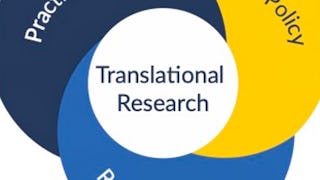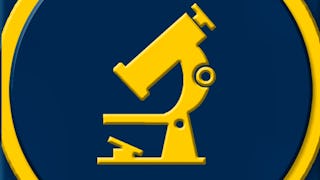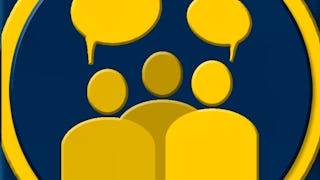Translational science is the process of turning observations in the laboratory, clinic, and community into interventions that improve the health of individuals and populations. In this course, you’ll learn about the role of translational research in moving scientific discoveries into applications for improving human health. With an understanding of the four stages of translational research, you’ll be able to assess team roles for each stage and explain the importance of rigorous research, responsible conduct of research, and the differences between them. Finally, you’ll learn about career opportunities within the in-demand field of translational research.


Introduction to Translational Science
This course is part of Translational Science Specialization

Instructor: Vicki Ellingrod
2,534 already enrolled
Included with
(14 reviews)
What you'll learn
Understand the role of translational science in moving scientific discoveries into applications for improving human health.
Understand the importance of addressing health disparities and inequities in translational science
Explore career opportunities within the in-demand field of translational science
Skills you'll gain
Details to know

Add to your LinkedIn profile
See how employees at top companies are mastering in-demand skills

Build your subject-matter expertise
- Learn new concepts from industry experts
- Gain a foundational understanding of a subject or tool
- Develop job-relevant skills with hands-on projects
- Earn a shareable career certificate

There are 4 modules in this course
The Introduction to Translational Science course provides you with an overview of the spectrum of translational research. You will learn important terminology and concepts to use as you practice setting career goals for translational research. In this module, you will learn how to 1) define translational research and its role in moving scientific discoveries into applications for improving human health, 2) list the stages of translational research and describe specific examples of research conducted at each stage.
What's included
1 video9 readings2 assignments1 app item
Welcome to Module 2 of Introduction to Translational Science. In this module you will learn how to 1) name the seven fundamental characteristics of a translational scientist, 2) identify team roles for research conducted in each stage of translational science, and 3) explain the importance of rigorous research.
What's included
6 videos3 readings1 assignment2 app items
Welcome to Module 3 of Introduction to Translational Science. In this module you will learn how to 1) understand the importance of diversity in assembling your research team, 2) explain the importance of mentoring in conducting translational research.
What's included
4 readings2 app items
Welcome to Module 4 of Introduction to Translational Science. In this module you will learn how to 1) give examples of strategies to address issues related to health disparities and inequities in translational research, 2) identify career opportunities in translational research.
What's included
1 video5 readings1 peer review1 app item
Earn a career certificate
Add this credential to your LinkedIn profile, resume, or CV. Share it on social media and in your performance review.
Instructor

Offered by
Explore more from Basic Science
 Status: Free Trial
Status: Free TrialUniversity of Michigan
 Status: Preview
Status: PreviewUniversity of Rochester
 Status: Free Trial
Status: Free TrialUniversity of Michigan
 Status: Free Trial
Status: Free TrialUniversity of Michigan
Why people choose Coursera for their career




Learner reviews
14 reviews
- 5 stars
85.71%
- 4 stars
0%
- 3 stars
0%
- 2 stars
0%
- 1 star
14.28%
Showing 3 of 14
Reviewed on Aug 28, 2022
Really good for introductory concepts in translational science. I really enjoyed it.

Open new doors with Coursera Plus
Unlimited access to 10,000+ world-class courses, hands-on projects, and job-ready certificate programs - all included in your subscription
Advance your career with an online degree
Earn a degree from world-class universities - 100% online
Join over 3,400 global companies that choose Coursera for Business
Upskill your employees to excel in the digital economy
Frequently asked questions
To access the course materials, assignments and to earn a Certificate, you will need to purchase the Certificate experience when you enroll in a course. You can try a Free Trial instead, or apply for Financial Aid. The course may offer 'Full Course, No Certificate' instead. This option lets you see all course materials, submit required assessments, and get a final grade. This also means that you will not be able to purchase a Certificate experience.
When you enroll in the course, you get access to all of the courses in the Specialization, and you earn a certificate when you complete the work. Your electronic Certificate will be added to your Accomplishments page - from there, you can print your Certificate or add it to your LinkedIn profile.
Yes. In select learning programs, you can apply for financial aid or a scholarship if you can’t afford the enrollment fee. If fin aid or scholarship is available for your learning program selection, you’ll find a link to apply on the description page.
More questions
Financial aid available,
¹ Some assignments in this course are AI-graded. For these assignments, your data will be used in accordance with Coursera's Privacy Notice.

